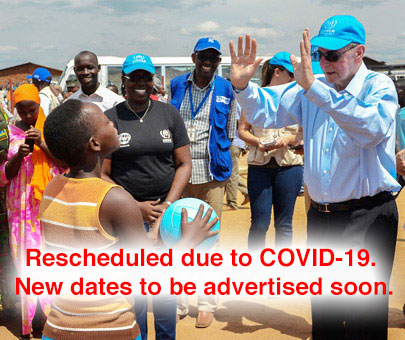Conflict Prevention Course (CPC20)
Conflict Management

Course Fee:
Terms and Conditions:
KAIPTC residential accommodation for all participants.
| In short | |
|
Course Date/Duration |
13 – 24 July 2020 CANCELLED |
|
Course Capacity |
30 participants |
|
Target Group |
Practitioners in the field and those who are looking forward to be inserted in an operational theatre (see details below) |
|
Course Language |
English only |
| Application Deadline |
08 May 2020 |
Background
Since the end of the Cold War, Africa has experienced various forms of armed conflicts, which have claimed millions of lives and displaced many others either as refugees or internally displaced persons. Some of these conflicts, mostly intra-state, have also led to the collapse of state and societal structures; have destroyed the fragile economies of many countries with adverse impact on the social conditions of the people; and have bequeathed terrible legacies of traumatized populations, ethnic hatred, banditry, and the proliferation of small arms and light weapons amongst others. The cases of Somalia, Liberia, Libya, Sierra Leone, DR Congo, Cote d’Ivoire, Guinea Bissau, Sudan and Mali are examples.
Although efforts are being made at the levels of the African Union (AU) Commission and Regional Economic Communities/Regional Mechanisms to respond to conflict situations, much remains to be done to ensure that appropriate conditions are created to make the recurrence of such conflicts difficult, if not impossible. In many countries across the continent, the conditions that lead to violent conflict are prevalent; pervasive poverty, unemployment particularly among the youth population, bad governance, exclusive politics, unconstitutional hold to political power, corruption and other mal-practices are the order of the day. This partly explains why at a time that most people believe that military interventions and election related conflicts ought to have been confined to history globally, Africa still faces such threats. The experiences in Guinea Bissau, Burundi and most recently Zimbabwe are a few examples that underscore the stark conflict realities on the continent. Indications are that there are a lot more countries in Africa where potentials for similar kinds of conflict are rife.
As a contribution to the conflict prevention efforts of the AU and ECOWAS in particular, KAIPTC will run the Conflict Prevention Course from 13 – 24 July 2020. The core elements of the training will be drawn from the Conflict Prevention Resource Pack for Civilian Actors which was developed through a collaboration between KAIPTC and the West Africa Civil Society Institute (WACSI) with the support of the German Technical Cooperation (GIZ), as a comprehensive civilian-driven operational strategy for conflict prevention and peacebuilding for West Africa in support of the ECOWAS Conflict Prevention Framework (ECPF).
Course Duration/ Description
The Conflict Prevention Course will be a two-week residential course to be held at the KAIPTC. It will be conducted in English and will be based on the Collaborative Problem Based Learning (CPBL) Methodology. The course will take a binary approach that will explore both the preventive and post conflict aspects of peacebuilding.
Aim and Objectives of the Course
The overall aim of the course is to provide knowledge and expertise on conflict prevention through an understanding and explanation of the factors that cause and trigger conflicts. Hence, the course will contribute to the implementation of the ECPF and the African Peace and Security Architecture (APSA)
Target Group
The course will target a mixed group of 30 practitioners in the field and those who are looking forward to be inserted in an operational theatre. In view of the two-sided approach to the course, priority will be given to personnel working with communities on the frontlines, Non-Governmental Organizations and multilateral organizations in ECOWAS member states. The selection process will also strive to include personnel from the ECOWAS Standby Force (ESF), AU Commissions and United Nations. Selection will strive to achieve gender balance of participants as much as possible.
Course Content
- Nature of the African State.
- Contemporary Security Challenges and Conflict Prevention.
- Gender and Conflict Prevention.
- Early Warning and Early Response.
- Natural Resource Governance and Conflict Prevention.
- Media, Communication and Conflict Prevention.
- Security Sector Reforms.
- Citizens, Governance and Conflict Prevention.
- Elections, Democracy and Conflict Prevention.
- Rule of Law and Transitional Justice.
- Human Rights, Theory and Practice.
- Indigenous Approaches to Conflict Prevention.
- Preventing Violent Extremism.
- Community and Conflict Prevention.
- Youth and Conflict Prevention.
- Introduction to Theories of Conflict and Conflict Prevention.
- Conflict Mapping/Analysis.
Teaching Methodology
The CPBL approach will be used in the delivery of the course hence course participants will play an active role under the guidance of an experienced team of facilitators. The course content will thus be delivered using a combination of tools such as lectures, case studies, small group works, exercises and simulation among others.
Selection Process
The selection processwillinvolve submission of bio-data through the KAIPTC application portal after which applicants will be shortlisted. Depending on the number of applicants, there could be a second phase of the selection process, which will involve the submission of a 600-word commentary paper on a topical peace and security issue to be determined by the Course Director. The results from the submission of this paper will count in the final selection of participants.
Relevant Facts
- KAIPTC residential accommodation for all participants.
- Facilitation team will be composed of resource persons from KAIPTC, NGOs, Conflict Prevention Practitioners and Mediators as well as academics among others.
How to Apply
Interested applicants are requested to kindly fill and submit an online application form. Access the application form using the link http://lms.kaiptc.org/moodle/course/view.php?id=5
Contact at KAIPTC
| For administrative issues | For course content issues |
| Mrs Marylyn Agblor Training Coordination Officer Tel. 00 233 (0) 302 718200 Ext. 1012 Fax. 00 233 (0) 302 718201 Email: marylyn.agblor@kaiptc.org |
Colonel Murtala Mohammed Course Director Telephone: 233 (0) 302 718200 Ext 1316 Mobile: 233 (0) 552 346068 Email: murtala.mohammed@kaiptc.org |

